Captain Sir Mansfield Smith-Cumming RN [1859-1923]
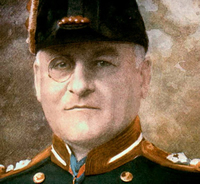
Captain Sir Mansfield Smith-Cumming
The founding father of Britain’s Secret Intelligence Service. His Agents called him C – he referred to them as his ‘scallywags’. In 1909 he was drawn from the naval backwater of harbour defence and given responsibility for building an espionage network for the newly established Secret Service Bureau. Punch-like, with angular features and keen grey eyes, he glared at recruits to the new service through a gold rimmed monocle, but as one of them later recalled, ‘the Chief’ inspired ‘feelings of deepest personal admiration and affection’ in those who worked for him.
Sir William Wiseman
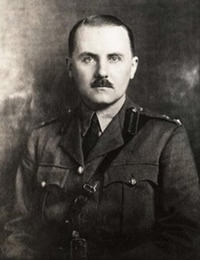
Sir William Wiseman
Baronet, businessman, journalist, spy. His father had served in the navy with C. When in 1915 he was gassed and invalided out of the army, C entrusted him with the setting up the Bureau’s first section in America. He was instructed to subvert German interests and counter Irish and Indian nationalist plots to undermine the British war effort. His network of spies in New York included some dubious characters, like the occultist and self proclaimed ‘Great Beast 666’, Aleister Crowley, and ‘ace of spies’, Sidney Reilly. But Wiseman was adept at cultivating influential American allies, including President Wilson’s friend and confidential advisor, Colonel Edward House.
Inspector Thomas Tunney
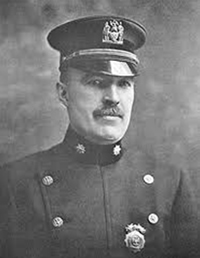
Inspector Thomas Tunney
The Head of New York Police Department’s Bomb Squad was the Bureau’s chief ally in the struggle to contain German and Irish Nationalist saboteurs in America. Wiseman’s deputy, Norman Thwaites, had worked as a foreign affairs consultant for the New York World newspaper before the war and knew Tunney. Thwaites thought very little of the American military intelligence agencies, dismissing them as ‘amateur operators’. He counted upon Tunney for the rough and tumble street work of gathering evidence of German sabotage, and knew he could rely on the policeman’s discretion when presented with secret intelligence gleaned by British spies.
Admiral Sir Reginald Hall [1870-1943]
![Admiral Sir Reginald Hall [1870-1943] Admiral Sir Reginald Hall [1870-1943]](http://www.andrewwilliams.tv/wp-content/uploads/2012/08/Admiral-Sir-Reginald-Hall.jpg)
Admiral Sir Reginald Hall [1870-1943]
Captain Henry Landau
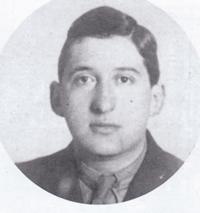
Captain Henry Landau
British diplomat turned Irish rebel, charismatic, homosexual, passionate, more prophet than politician. Born near Dublin, his Protestant father had fought for the British Empire as a soldier; Casement made his name and was knighted for bringing to light the inhumanity of colonial oppressors. Leaving the British diplomatic service in 1913, he took up the cause of Irish freedom, helping to recruit a volunteer force to fight for ‘the liberties’ of the Irish people. On the outbreak of the war, he sought support in Berlin, ready to force independence at the point of a German bayonet. But isolated from comrades and decision making in Ireland and cast down by his inability to persuade the Germans to offer more than a few rifles, he suffered an emotional collapse. A German submarine landed him back in Ireland on the eve of the Easter Rising of 1916, but he was arrested after only a few hours and took no part in the fighting. Tried for treason in London, he was condemned to death and hanged at Pentonville Prison.
Roger Casement
![Roger Casement [1863-1916] Roger Casement [1863-1916]](http://www.andrewwilliams.tv/wp-content/uploads/2012/08/Roger-Casement.jpg)
Roger Casement
Dr Anton Dilger
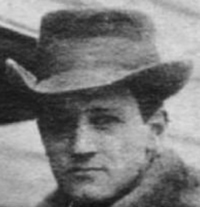
Dr Anton Dilger
The German American doctor who spearheaded German germ warfare operations against the British. Born to German parents in Virginia – his father an American military hero – he was sent to school and university in Germany. When the war broke out he served as a volunteer doctor, but early in 1915 he was identified by German intelligence as the perfect agent for a secret biological weapons programme. With help from his America family, he rented a house on the outskirts of Washington and began to culture the glanders and anthrax bacilli in its basement. German and Irish American saboteurs were given syringes of both to infect horses and mules waiting to be shipped to the Allies on the Western Front. Dilger continued to work for the Germans when the United States entered the war on the side of the Allies. A few weeks before its end he travelled to Madrid where he contracted and died of an even more deadly pathogen – the Spanish flu.
Captain Franz von Rintelen
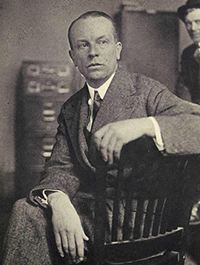
Captain Franz von Rintelen
The self styled ‘Dark Invader’, clever, energetic, vain, ruthless and the architect of German’s sabotage campaign in the United States. A fluent English speaker with close connections in the United States, von Rintelen was charged by German Naval intelligence with disrupting war supplies to the Allies by any means possible. What he couldn’t purchase he tried to destroy with the help of saboteurs recruited from the German and Irish working on the docks. Specially designed cigar shaped incendiaries were planted on British munitions ships, their timers set to go off at sea. His campaign of destruction came to an end in the summer of 1915 as the net was closing on his activities. He took passage back to Germany but his ship was intercepted by the Royal Navy and he was taken into custody. He spent the next five years in British and American prisons.
Dr Heinrich Albert
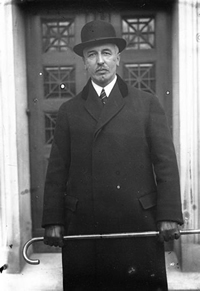
Dr Heinrich Albert
A diplomat at the German Embassy in Washington before the war and a lawyer by training, he nevertheless felt no compunction in acting as paymaster for illegal acts of destruction in the United States. Using the offices of the great German shipping lines in New York as cover, he funded the purchase of munitions, propaganda in newspapers, illegal strikes on the docks, the forging of false papers, and von Rintelen’s entire sabotage operation. He was exposed as a spy when his case was stolen and its incriminating contents published in the New York World. He was allowed to remain in the United States but left a few months later when America entered the war on the side of the Allies.
